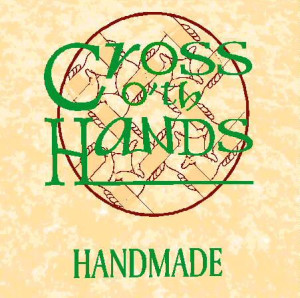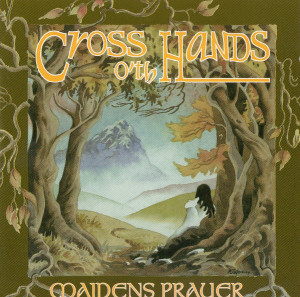 Cross o’th Hands (COTH) is a four piece group from the Derbyshire area in central England. They have been playing together since 1994. The lineup is the same as when they started: Sarah Matthews, fiddle and mandola; Doug Eunson, melodeons; Michelle Short, bodhran, percussion and whistle; and John Adams, guitar, guizouki and mandolin. They all sing as well.
Cross o’th Hands (COTH) is a four piece group from the Derbyshire area in central England. They have been playing together since 1994. The lineup is the same as when they started: Sarah Matthews, fiddle and mandola; Doug Eunson, melodeons; Michelle Short, bodhran, percussion and whistle; and John Adams, guitar, guizouki and mandolin. They all sing as well.
Their first album Handmade was released in 1996. It is a mix of traditional songs, like “Lord Malborough” and “Flandyke Shore,” with newer songs – some written by the band, and tunes. Seven of the thirteen tracks are instrumental and on the songs the boys take the lead on half. My first impression is that they went into the studio a little too soon. They lack direction, sometimes just copying other groups, like in “Lord Malborough,” which is a drumless note for note copy of the Fairport Convention version. At other times they really rework the songs, like adding the harmonies to “Flandyke Shore.”
The instrumental work is stronger, but contains a strange mix of the well known, like “The Princess Royal” and “Donkey Riding,” and more the unknown. Sarah Matthews’ own “Hampton Caught” is one of my favourites. The album is not without its good points. Some of COTH’s originals, like “Good Times” and “Just Good Friends,” show great promise. But overall it is not one of those records that makes you talk about the future of folk music.
 The second album Maidens Prayer shows a band that has matured and grown. They have found their direction and have put more work into the arrangements and recording. There are only four instrumentals among the eleven tracks. “Danby Wiske/Drops Of Brandy” starts off in a traditional manner and makes you expect one of those Irish-inspired albums with stompy instrumentals mixed with slow ballads. But this is only a trick. On “Orange Blossom” they rework a Morris tune into more of an air. And “Caught Short” contains two tunes, written by Matthews and Eunson, intertwined. “Journey’s End/Bourée a Droite” combines their own tune with a French dance tune, a little more mediæval in sound.
The second album Maidens Prayer shows a band that has matured and grown. They have found their direction and have put more work into the arrangements and recording. There are only four instrumentals among the eleven tracks. “Danby Wiske/Drops Of Brandy” starts off in a traditional manner and makes you expect one of those Irish-inspired albums with stompy instrumentals mixed with slow ballads. But this is only a trick. On “Orange Blossom” they rework a Morris tune into more of an air. And “Caught Short” contains two tunes, written by Matthews and Eunson, intertwined. “Journey’s End/Bourée a Droite” combines their own tune with a French dance tune, a little more mediæval in sound.
The songs contain a lot of instrumental work as well. There are introductions, solos and interludes, all carefully arranged and presented. Not having a natural lead singer they more than compensate by using harmonies to a great extent. The girls do most of the lead singing, but often both of them together, and the boys joins in on choruses. The harmonies as well are arranged with great care.
Maidens Prayer also includes two songs from other writers, both well adjusted to the band. Anne Lister’s old classic “Moth” is sung and played well, and K Sutcliffe’s “Coal not Dole” is mostly done a cappella with the instruments there on the introduction only. It is one of the most successful tracks on the album.
There are originals written by various members of the band, but still always sounding distinctively COTH. The ones I like the most are “Good Old Land” and the closing “Maidens Prayer.” “Good Old Land” tells of the very old times, before the gentry took charge of the land. The lyrics may be a bit too sentimental – after all, the old times weren’t always that good. But “Good Old Land” has a catchy tune that sticks in your head. “Maidens Prayer” is a slower song with an instrumental tune, “The Attingham Waltz” by Helena Torpy, which really enhances it.
This disc also gets full marks for the lovely art work in the booklet, with reproductions of paintings by Pete Wolley, a Derbyshire artist. It is one of the most beautiful booklets I have seen in many years.
In summary, skip Handmade, but if you are interested in good, elaborate acoustic music with its roots deep in the English soil, Maidens Prayer is a record to look for. If COTH keeps developing like this their third one will go down a storm.
(Cross o’th Hands, 1996 and 1999)
COTH’s website is here!
